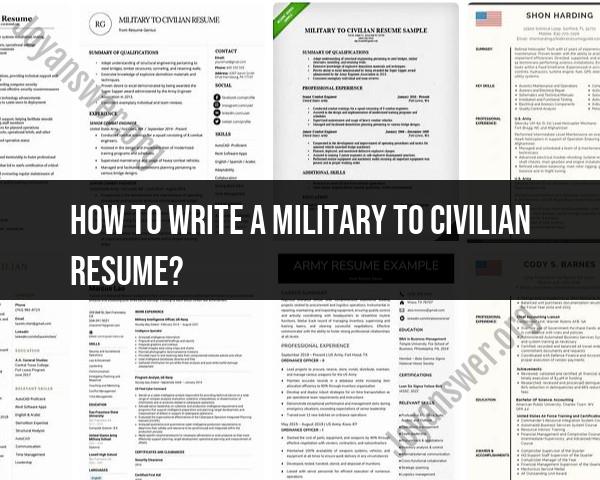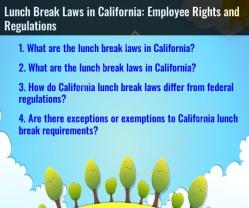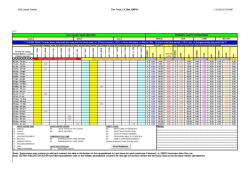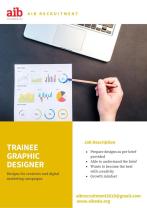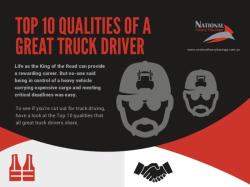How to write a military to civilian resume?
Transitioning from a military career to a civilian job can be a challenging process, and creating a military to civilian resume is a critical step in this transition. Here's a step-by-step guide on how to write an effective military to civilian resume:
Choose the Right Format:
- The most common resume formats for civilian employment are the reverse-chronological and functional formats.
- A reverse-chronological resume lists your work experience in reverse order, starting with your most recent job. This format is often preferred by employers.
- A functional resume focuses on skills and qualifications, making it a good choice if you want to emphasize transferable skills gained in the military.
Contact Information:
- Include your full name, phone number, email address, and LinkedIn profile (if applicable) at the top of your resume.
Objective or Summary:
- Consider including a brief objective or summary statement at the beginning of your resume. Highlight your career goals and how your military experience aligns with the civilian job you're seeking.
Highlight Transferable Skills:
- Identify the skills you've gained in the military that are transferable to civilian jobs. Common transferable skills include leadership, teamwork, problem-solving, and adaptability.
- Use the job posting and industry research to identify the skills and qualifications that are in demand for the specific job you're applying for.
Describe Your Military Experience:
- Translate your military experience into civilian language. Avoid military jargon and acronyms that civilians may not understand.
- Use action verbs and be specific about your accomplishments, responsibilities, and achievements.
- Quantify your achievements whenever possible. For example, "Led a team of 15 soldiers" or "Managed a budget of $1 million."
Education:
- List your educational background, including any relevant military training, degrees, and certifications.
- If you have a college degree, it's usually beneficial to include it, even if it's not directly related to the job you're applying for.
Professional Associations and Certifications:
- Mention any professional associations, certifications, or licenses that are relevant to the job.
Keywords and ATS Compatibility:
- Many employers use Applicant Tracking Systems (ATS) to screen resumes. Ensure that your resume includes relevant keywords from the job description to increase your chances of passing through ATS filters.
Tailor Your Resume:
- Customize your resume for each job application. Emphasize the skills and experiences most relevant to the specific job you're pursuing.
Include a Professional Summary:
- In addition to the objective or summary statement at the beginning, consider adding a professional summary at the end of your resume. Summarize your qualifications, key accomplishments, and how they align with the job you're seeking.
Proofread and Edit:
- Review your resume for grammar, spelling, and formatting errors. Attention to detail is essential.
Seek Feedback:
- Ask peers or mentors to review your resume and provide feedback.
Use a Clean, Readable Format:
- Choose a professional and easy-to-read font and maintain consistent formatting throughout your resume.
Optional Sections:
- Depending on your experience and the job you're applying for, you can include additional sections such as volunteer work, awards, or publications.
Cover Letter:
- Consider writing a cover letter that complements your resume by explaining your military experience, transferable skills, and why you're a good fit for the civilian role.
Remember that the transition from the military to civilian employment may be a process, and it may take time to secure a civilian job. Tailoring your resume for each application and networking with civilian professionals can also be beneficial in your job search.
Tips and strategies for creating a military-to-civilian resume
Here are some tips and strategies for creating a military-to-civilian resume:
- Highlight your transferable skills. When translating your military experience to a civilian job, it is important to focus on your transferable skills. These are skills that are valuable in both military and civilian settings. Examples of transferable skills include leadership, teamwork, problem-solving, communication, and organization.
- Use civilian language. When describing your military experience on your resume, be sure to use civilian language that is easy to understand. Avoid using military acronyms and jargon.
- Quantify your accomplishments. When possible, quantify your accomplishments in order to demonstrate the value of your experience. For example, instead of saying "managed a team of 10 soldiers," say "managed a team of 10 soldiers responsible for completing $1 million worth of projects on time and within budget."
- Tailor your resume to each job you apply for. When applying for a civilian job, be sure to tailor your resume to the specific job requirements. Highlight the skills and experience that are most relevant to the position.
The unique challenges and opportunities in transitioning to civilian employment
One of the biggest challenges in transitioning from military to civilian employment is the different culture. The military and civilian worlds have different values, norms, and expectations. For example, the military is a highly structured environment with a clear chain of command. In contrast, the civilian world is more informal and less hierarchical.
Another challenge is translating military skills and experience to civilian job qualifications. Civilian employers may not understand your military experience, so it is important to be able to articulate the value of your skills and experience in civilian terms.
Despite the challenges, there are also many opportunities in transitioning to civilian employment. Veterans have many valuable skills and experience that are in high demand in the civilian world. Additionally, there are many resources and assistance available to help veterans transition to civilian employment.
Translating military skills and experience to civilian job qualifications
Here are some tips for translating military skills and experience to civilian job qualifications:
- Identify your transferable skills. Make a list of all of your skills and experience, both military and civilian. Then, identify the skills that are most transferable to the civilian world.
- Research civilian job requirements. Research the job requirements for the civilian jobs that you are interested in. Identify the skills and experience that are most important for those jobs.
- Highlight your transferable skills in your resume and cover letter. When describing your military experience, be sure to highlight your transferable skills. Use civilian language and quantify your accomplishments whenever possible.
Showcasing leadership and adaptability in a military-to-civilian resume
Leadership and adaptability are two of the most important skills that veterans can showcase in their military-to-civilian resumes. Here are some tips for highlighting these skills:
- Provide specific examples of your leadership experience. When describing your leadership experience, be sure to provide specific examples of how you led your team to achieve success. Use action verbs and quantify your results whenever possible.
- Discuss your adaptability to change. The civilian world is constantly changing, so it is important to demonstrate your adaptability to change in your resume. Discuss how you have adapted to change in your military career and how you can apply your adaptability to the civilian world.
Utilizing resources and assistance for crafting an effective resume
There are many resources and assistance available to help veterans craft effective resumes. Here are a few examples:
- Veteran Service Organizations (VSOs): VSOs offer a variety of services to veterans, including resume writing assistance.
- State and local government job centers: Many state and local government job centers offer resume writing workshops and other services to help veterans find jobs.
- Online resources: There are a number of online resources that can help veterans write their resumes, such as the Bureau of Labor Statistics' resume writing guide.
By following these tips and strategies, veterans can create effective resumes that will help them land their dream civilian jobs.
